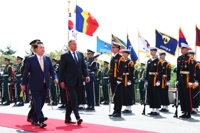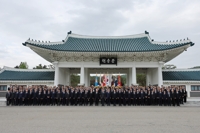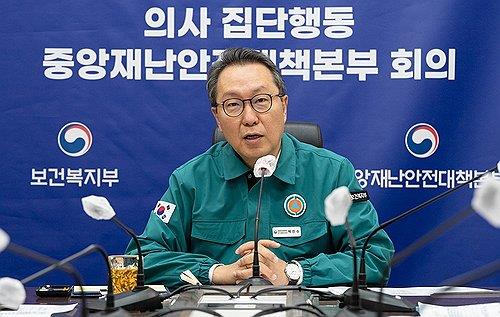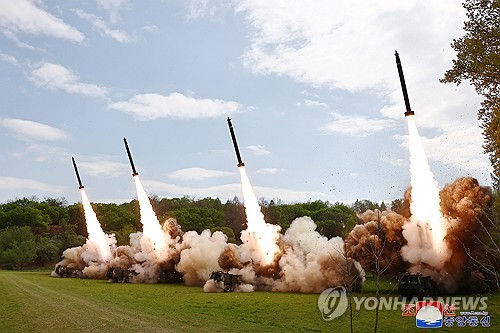(3rd LD) Moon, party leaders condemn N.K. nuke, missile provocations
(ATTN: ADDS more info in last 4 paras)
SEOUL, Sept. 27 (Yonhap) -- President Moon Jae-in and the leaders of major parties issued a joint statement Wednesday condemning North Korea's provocations and calling for a peaceful resolution of the nuclear standoff.
In a show of bipartisanship, they announced a five-point agreement after their meeting at Cheong Wa Dae, also reaffirming they would not let another armed conflict occur on the Korean Peninsula.
The talks, the third of their kind, came amid heightened tensions caused by Pyongyang's sixth and most powerful nuke test on Sept. 3 and a series of ballistic missile launches.
"(We) strongly condemn North Korea's nuclear and missile provocations that threaten peace and stability," reads the joint statement adopted after the dinner gathering that lasted two hours and 15 minutes.
"We urge the North to immediately halt provocations and come forward onto a path towards peace and denuclearization," it added. The statement was announced by their spokespersons.
The meeting was attended by Choo Mi-ae, Ahn Cheol-soo, Joo Ho-young and Lee Jung-mi, who represented the ruling Democratic Party, People's Party, Bareun Party and Justice Party, respectively. The leader of the main opposition Liberty Korea Party refused to attend, saying he does not want to serve as "background for a political show."
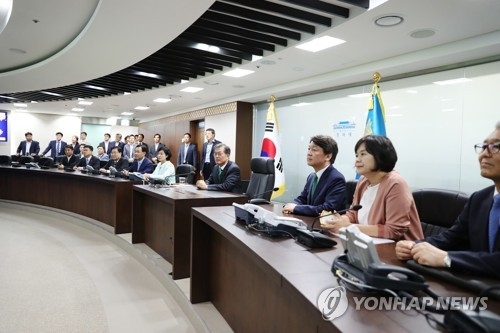
President Moon Jae-in and the leaders of major parties visit the crisis management center at the presidential office Cheong Wa Dae in Seoul on Sept. 27, 2017, in this photo provided by Moon's office. (Yonhap)
During the talks, the leaders also agreed to work together to faithfully implement U.N. Security Council sanctions against the North, strengthen the South Korea-U.S. alliance and bolster deterrence capabilities by enhancing the credibility of America's extended deterrence.
Extended deterrence refers to the stated U.S. commitment to defend its ally by mobilizing all military capabilities, nuclear and conventional, against the North's aggression and provocations.
Such a commitment was called into question amid Pyongyang's beefed-up push to develop a nuclear-tipped missile capable of hitting the U.S. mainland. Some argue Washington may dither on defending its Asian ally under attack as its military action could put its own territory at risk.
The joint statement also included the shared understanding of the importance of bipartisan cooperation in reducing tensions on the peninsula, and of the need to quickly form a standing policy consultation body among the government and major parties.
Following the talks, Moon took the political leaders to the presidential office's underground crisis management center in what appears to be a move to highlight the need for a united front in the face of escalating security threats from the North.
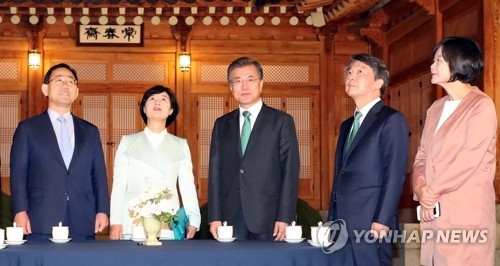
President Moon Jae-in (C) holds a special meeting with ruling and opposition party leaders at the presidential office Cheong Wa Dae in Seoul on Sept. 27, 2017. They are (from L) Joo Ho-young, floor leader and acting chief of the splinter Bareun Party; Rep. Choo Mi-ae, head of the ruling Democratic Party; Moon; Ahn Cheol-soo of the liberal People's Party; and Rep. Lee Jeong-mi of the progressive Justice Party. (Yonhap)
The opposition leaders mostly agreed on the need for all-out efforts to tame the increasingly provocative North Korea, but some raised questions over how to do so.
"There can be no difference between ruling and opposition parties when it comes to national security, and we are ready to actively help. We are only asking (the government) to do it more thoroughly because we believe the ongoing efforts may not be enough," Joo, the acting chief of the conservative Bareun Party, was quoted as saying.
Throughout the meeting, Moon was seen striving to set the mood for closer ties with the opposition-led legislature.
The president expressed regret over a series of personnel debacles. Some of his Cabinet and justice nominees have withdrawn or were rejected by parliament amid controversy about their political views and ethical records.
The president, in particular, wore a green tie in a symbolic message to the People's Party, seen as holding a "casting vote" in important legislative affairs. Green is the emblematic color of the minor party.
But Moon defended the government's campaign to address wrongdoings by the two preceding conservative administrations, including corruption, nepotism and blacklisting of celebrities deemed critical of government policies.
"Clearing up deep-rooted ills is not to rebuke and punish certain individuals, but to change the very structure of unfairness and privileges. It is not a political reprisal. This should not be misunderstood," Moon was quoted by ruling party officials.
bdk@yna.co.kr
(END)
-
 Overdue debut of Korean abstract art pioneer Yoo Young-kuk at Venice Biennale
Overdue debut of Korean abstract art pioneer Yoo Young-kuk at Venice Biennale -
 Relax, immerse yourself in scents at Venice Biennale's Korean Pavilion
Relax, immerse yourself in scents at Venice Biennale's Korean Pavilion -
 S. Korea marks 30th anniv. of Korean Pavilion at Venice Biennale with contemporary art
S. Korea marks 30th anniv. of Korean Pavilion at Venice Biennale with contemporary art -
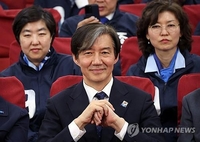 Ex-Justice Minister Cho slams Yoon's statement on crushing election defeat
Ex-Justice Minister Cho slams Yoon's statement on crushing election defeat -
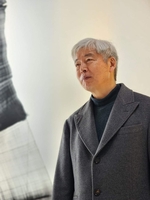 Artist Lee Bae captures ethereal Korean aesthetics at Venice Biennale
Artist Lee Bae captures ethereal Korean aesthetics at Venice Biennale
-
 Overdue debut of Korean abstract art pioneer Yoo Young-kuk at Venice Biennale
Overdue debut of Korean abstract art pioneer Yoo Young-kuk at Venice Biennale -
 Relax, immerse yourself in scents at Venice Biennale's Korean Pavilion
Relax, immerse yourself in scents at Venice Biennale's Korean Pavilion -
 Artist Lee Bae captures ethereal Korean aesthetics at Venice Biennale
Artist Lee Bae captures ethereal Korean aesthetics at Venice Biennale -
 S. Korea marks 30th anniv. of Korean Pavilion at Venice Biennale with contemporary art
S. Korea marks 30th anniv. of Korean Pavilion at Venice Biennale with contemporary art -
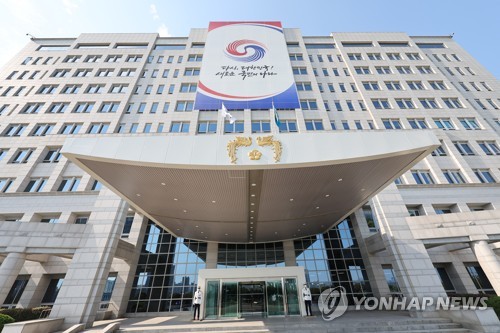 (LEAD) Presidential office denies Moon aides under consideration for PM, chief of staff
(LEAD) Presidential office denies Moon aides under consideration for PM, chief of staff
-
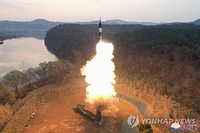 (LEAD) N. Korea fires several short-range ballistic missiles toward East Sea: JCS
(LEAD) N. Korea fires several short-range ballistic missiles toward East Sea: JCS -
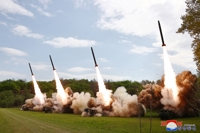 (LEAD) N. Korea says Kim guided simulated nuclear counterattack drill
(LEAD) N. Korea says Kim guided simulated nuclear counterattack drill -
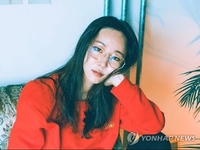 Hybe launches audit into NewJeans' label ADOR over alleged independence move
Hybe launches audit into NewJeans' label ADOR over alleged independence move -
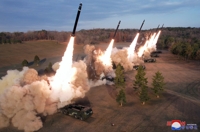 N. Korea says Kim guided simulated nuclear counterattack drills for 1st time
N. Korea says Kim guided simulated nuclear counterattack drills for 1st time -
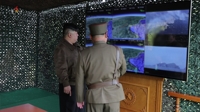 S. Korea warns N. Korea will face end of regime if it uses nuclear weapons
S. Korea warns N. Korea will face end of regime if it uses nuclear weapons















